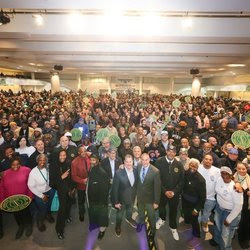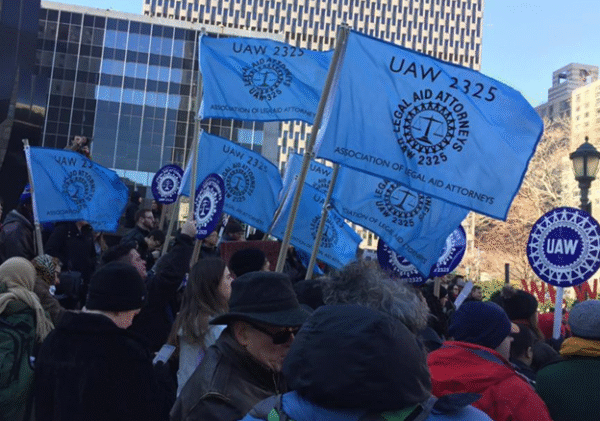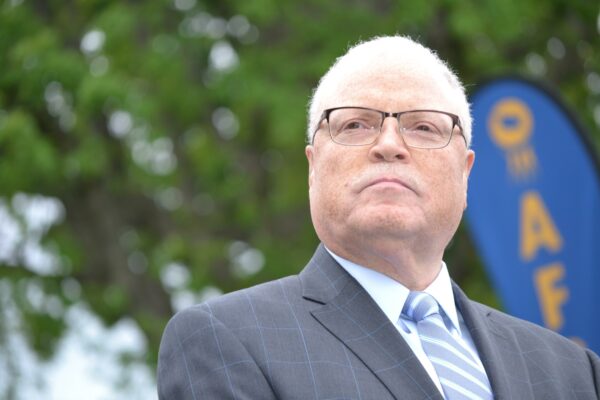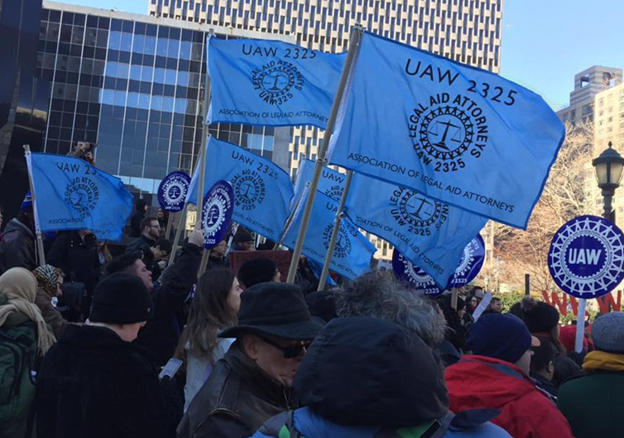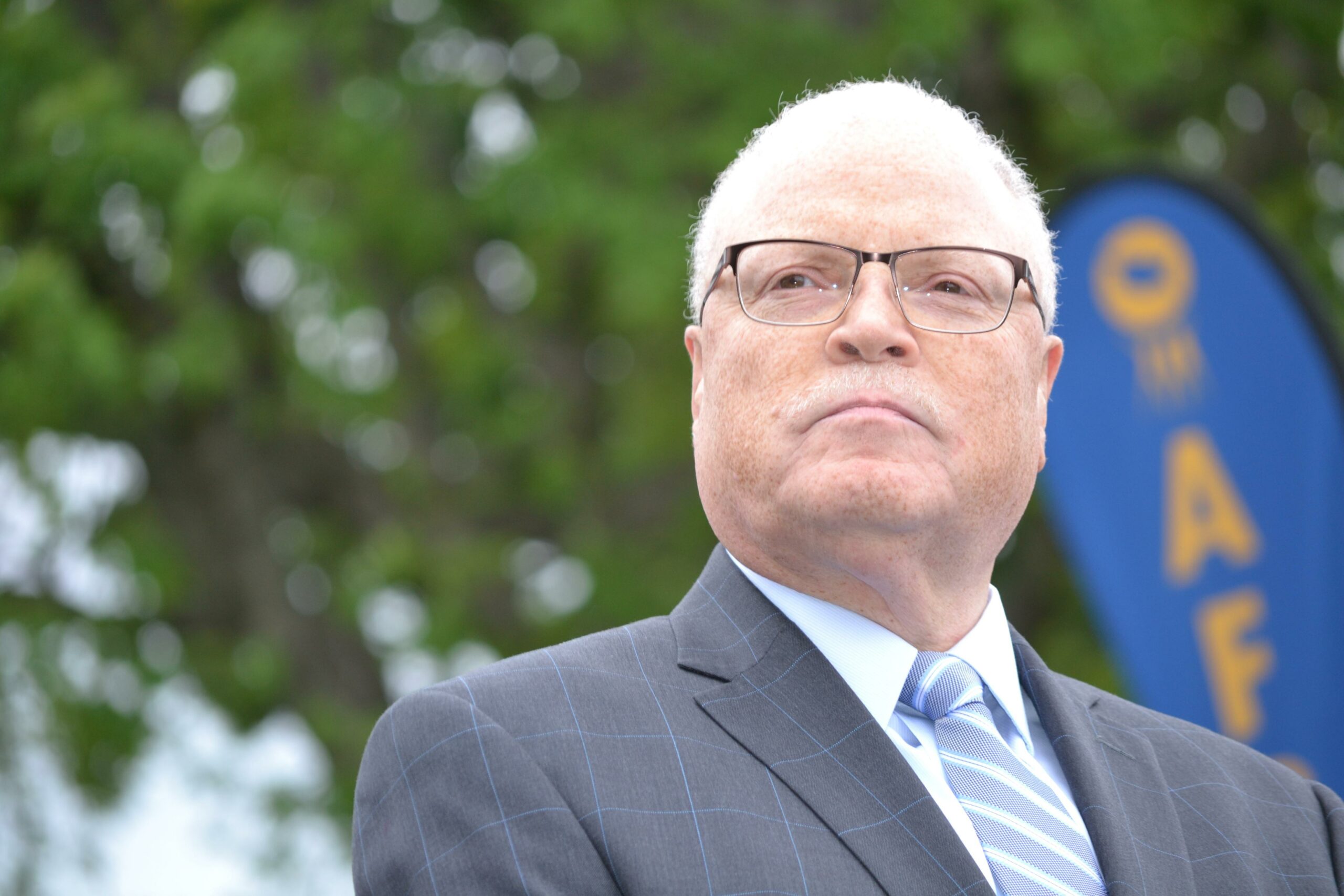New York, NY – A coalition of the nation’s largest public pension funds, with billions of dollars in Amazon stock, is urging shareholders to reject the re-election of a pair of long-time corporate directors who oversee Amazon’s workplace and compensation policies at the corporation’s upcoming May 25 shareholder meeting.
The national effort is being led by New York City Comptroller Brad Lander and New York State Comptroller Tom DiNapoli.
The New York City Retirement System and New York State Common Retirement Fund hold 1.7 million shares of Amazon stock valued at approximately $5.3 billion dollars. At an April 21st conference held at the Harvard Club several other elected state treasurers from around the country committed to joining in the effort.
According to the organizers of the event, the public pension officials in attendance are collectively responsible for managing $2 trillion in investments.
The forum, sponsored by the Open Society, For the Long Term, a non-profit committed to sustainable investing and the Center for American Progress, featured remarks by Staten Island-based Amazon Labor Union organizers Chris Smalls, Derek Palmer, Angelica Maldonado and Brett Daniels.
Smalls, who at the time was an Amazon supervisor, told the audience early on in the COVID pandemic he was concerned about the lack of personnel protective equipment and social distancing at the sprawling facility that employs 5,000. Amazon fired Smalls as his organizing bid of the independent Amazon Labor Union was getting traction.
“I said if you don’t do anything blood is going to be on your hands and it was because people have died in that facility from COVID-19,” Smalls said. “That is just heartbreaking because that’s what I was trying to avoid and it happened and then I was fired for trying to speak out on a policy that none us received.”
The shareholder drive for accountability came just weeks after ALU won their National Labor Relations Board vote to form a union at Amazon’s Staten Island facility, the first such victory in the country.
“Amazon’s quota and other systems for mass-managing its workforce place extraordinary pressure on its workforce, resulting in higher than average injury rates and costly legal and regulatory scrutiny,” New York City Comptroller Brad Lander told the conference. “Turnover rates remain as high as one-hundred-fifty-percent, leading some Amazon executives to worry about running out of hirable employees in the U.S.”
Lander continued. “As warehouse workers have attempted to organize and form unions, most prominently here on Staten Island, the company has repeatedly been investigated and charged in connection with workers’ rights violations by both state and federal regulators. I have had the chance to talk with Amazon warehouse workers about the physical and emotional toll that the company’s policies take on their lives, and they’re organizing for safe jobs that enable them to support their families.”
“Effective management of the company’s workforce is the hallmark of a sound, sustainable and profitable strategy for Amazon,” Lander said “Yet under the leadership of directors Huttenlocher and McGrath, Amazon’s board has allowed the company to repeatedly violate labor law, operate with alarmingly high rates of injury and turnover that is fundamentally unsustainable.”
But Lander told attendees that it wasn’t only Amazon’s Human Resources policies that were a risk to shareholders’ long-term value, but its skewed compensation system which paid its top five executives approximately $400 million in compensation last year, including $212 million in in time-vested shares to Amazon CEO Andrew Jassy.
Under Amazon’s corporate board’s watch, “the pay ratio between the CEO and the median compensated employee is 6,474-to-1 (six thousand four hundred and seventy four to one). That tells you where their human capital management priorities lie,” Lander told the audience.
“We have continuously seen significant concerns about how Amazon protects its workers health and safety, and upholds its own policies on human rights and freedom of association,” New York State Comptroller Thomas P. DiNapoli said in a statement. “Shareholders need effective, independent board oversight of the company’s policies and practices related to its workforce, but unfortunately, these two directors have repeatedly failed to provide it. It’s time for responsible and engaged directors to take their place on Amazon’s board.”
Panelist Erica Smiley, executive director of Jobs with Justice, a non-profit committed to workers’ rights, said that the Staten Island Amazon union vote was a watershed moment not dissimilar from the “sea change” when in 1864 a half-million African Americans walked off southern plantations.
“When I hear people say the great resignation I think what’s happening here in this moment in Amazon and many other places where people are simply walking out — they aren’t going to take it anymore,” Smiley said. “It’s not that they are leaving the workforce. They are looking for dignity and respect.”
Workers at Amazon’s Bessemer, Alabama facility recently rejected a union organizing drive. The results of that vote are being contested by the Retail, Wholesale and Department Store Union who filed a petition that’s pending with the National Labor Relations Board alleging the employer illegally “created an atmosphere of confusion, coercion and/or fear of reprisals and thus interfered with the employees’ freedom of choice.”
Amazon has said it “cares deeply about the health and safety” of its employees while paying at least $15 an-hour to start and some roles averaging $18 an-hour with benefits for full-time employees “like health care on day one, and fully paid family leave.”

